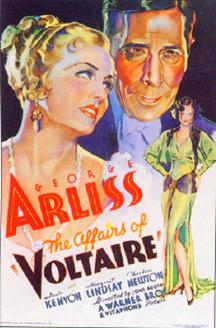Voltaire (film)
| Voltaire | |
|---|---|
 Theatrical release poster | |
| Directed by | John G. Adolfi |
| Written by |
|
| Starring | |
| Cinematography | Tony Gaudio |
| Edited by | Owen Marks |
| Music by |
|
Production company | |
| Distributed by | Warner Bros. |
Release date |
|
Running time | 72 minutes |
| Country | United States |
| Language | English |
| Budget | $310,000[1] |
| Box office | $765,000[1] |

Voltaire is a 1933 American pre-Code biographical film directed by John G. Adolfi and starring George Arliss as Voltaire, an 18th-century French writer and philosopher. It is the last Arliss' film produced by Warner Bros.
Plot
[edit]In pre-Revolutionary France, Voltaire champions the oppressed commoners and tries to warn King Louis XV (Reginald Owen) about the growing unrest among his subjects. The writer has a powerful ally in Madame Pompadour (Doris Kenyon), Louis' mistress, but the Count de Sarnac (Alan Mowbray) opposes him for his own ends.
When Voltaire pleads for the life of Calas, unjustly accused of treason, Louis is inclined to pardon the man, but Sarnac persuades him that it would be a sign of weakness, and Calas is swiftly executed. As a reward, Sarnac gains the wealthy man's estates. Voltaire invites Calas' daughter and rightful heiress, Nanette (Margaret Lindsay), to shelter in his home.
Meanwhile, Sarnac tries to persuade the King that Voltaire is a traitor, citing his well-known friendship with Frederick the Great and claiming that it is he who is betraying French secrets to the Prussian ruler. Louis is not entirely convinced, but does banish Voltaire from his royal court at Versailles.
As a result, Madame Pompadour becomes reluctant to aid Voltaire further, until he arranges it so that she can overhear from Sarnac's own lips his ambition to replace her as Louis' paramount adviser. Then, she persuades the King to allow Voltaire to stage a new play at Versailles.
The production is a thinly disguised portrayal of Calas' execution and the aftermath transposed to an exotic setting. Voltaire hopes to open the King's eyes to his danger. Voltaire recruits Nanette to portray the part of herself. The King is sympathetic to the theatrical Nanette's plight, not recognizing himself as her despised oppressor until Sarnac points it out. Then Louis orders the play stopped before the explanatory final scene and orders that Voltaire be sent to the Bastille. However, hearing of a rich present given to Sarnac by Frederick, Voltaire unmasks the count as the real traitor. Sarnac is arrested, and Nanette's estates are restored to her.
Cast
[edit]- George Arliss as Voltaire
- Doris Kenyon as Madame Pompadour
- Margaret Lindsay as Nanette Calas
- Reginald Owen as King Louis XV
- Theodore Newton as Francois, a friend of Nanette
- Alan Mowbray as the Count de Sarnac
- Gordon Westcott as the Captain
- Murray Kinnell as Emile
- Doris Lloyd as Madame Clarion
- Douglass Dumbrille as Oriental King in Play
- David Torrence as Dr. Tronchin, Voltaire's doctor
- Heinie Conklin as Protester (uncredited)
Box office
[edit]According to Warner Bros the film earned $393,000 domestically and $372,000 foreign.[1]
Preservation status
[edit]- The film is preserved in the Library of Congress collection.[2] Though it has yet to be released on DVD, it does air occasionally on Turner Classic Movies.
References
[edit]- ^ a b c Warner Bros financial information in The William Schaefer Ledger. See Appendix 1, Historical Journal of Film, Radio and Television, (1995) 15:sup1, 1-31 p 13 doi:10.1080/01439689508604551
- ^ Catalog of Holdings The American Film Institute Collection and The United Artists Collection at The Library of Congress, (<-book title) p.203 c.1978 by The American Film Institute
External links
[edit]- Voltaire at IMDb
- Voltaire at the TCM Movie Database
- 1933 films
- American biographical drama films
- American black-and-white films
- Films set in the 18th century
- Films set in France
- Films based on American novels
- Biographical films about philosophers
- Films directed by John G. Adolfi
- Cultural depictions of Louis XV
- Cultural depictions of Madame de Pompadour
- Cultural depictions of Voltaire
- 1930s biographical drama films
- 1930s historical films
- American historical films
- Warner Bros. films
- 1933 drama films
- 1930s English-language films
- 1930s American films
- Films scored by Bernhard Kaun
- English-language biographical drama films
- English-language historical films
